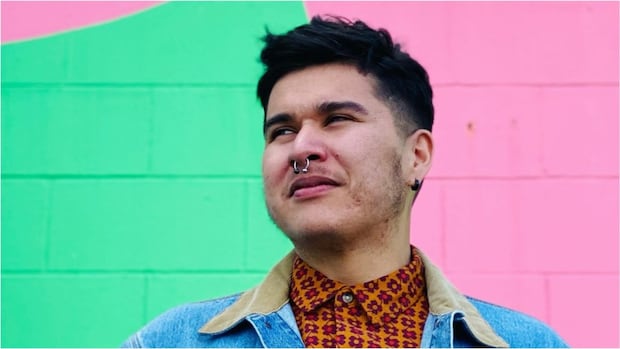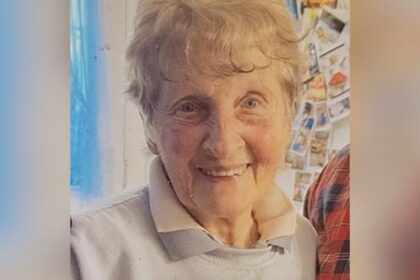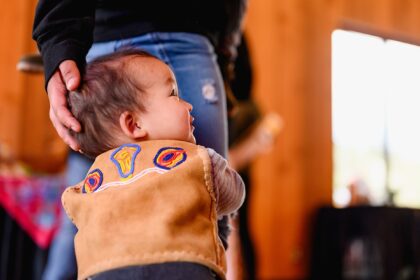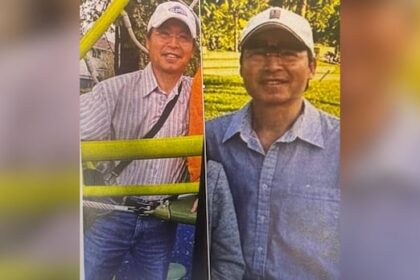British Columbia·Q&AAs Billy-Ray Belcourt explains, his latest work, The Idea of An Entire Life, is his “thunderous yes to living.”The Idea of An Entire Life is Belcourt’s ‘thunderous yes to living’CBC News · Posted: Sep 21, 2025 11:00 AM EDT | Last Updated: 8 hours agoBilly-Ray Belcourt’s latest poetry collection, The Idea of an Entire Life, is available now. (Jaye Simpson)When Billy-Ray Belcourt wrote his first book, This Wound is a World, it came from a place of “desperation.””I didn’t necessarily know how to live a full, queer, Indigenous life,” he said. “Part of the book was working through that anxiety and trying to imagine a possibility for that full, queer, Indigenous life.”But about eight years later, things are different. Belcourt is now an award-winning author and poet, and a professor at the University of British Columbia.His new collection of poetry, The Idea of An Entire Life, came from a place of stability, in which he could think more clearly about what it means to be himself. “This book … is essentially my thunderous yes to living.”Belcourt spoke with CBC’s Margaret Gallagher, the host of North by Northwest. This interview has been edited for length and clarity. How did you come to write poetry?I first started when I was in undergrad. I was in classes at the University of Alberta. Native studies, women studies, sociology, etc. I was learning a great deal about history, about oppression, and coming to the realization that my life had been partly determined by history. And I felt a great deal of emotion about that.The assignments I was being given didn’t really give me space to work through those emotions. And I kind of stumbled onto poetry on the Internet. I was watching recordings of spoken word poets and immediately recognized that they were doing something that I wanted to do and that would help me further develop my historical consciousness, my political consciousness, and ultimately allow me to better conceptualize my own life and my community and Indigenous history more broadly.As I was reading this, I found myself jotting down different phrases so I could keep them with me because they’re so powerful and I’m just wondering how you begin to take all of that and construct a poem?I’ve always been interested in how a turn of phrase or a certain way of wording something could be felt both intellectually and in the body.That probably was taught to me through theory in my undergrad and in grad school, that a beautiful sentence could be compelling and philosophically resonant, and also could live in our bodies.I’ve read a lot of beautiful sentences in my life and they have helped me live, and have made living worthwhile. I’m always trying to, I think, write a beautiful sentence. Maybe every book is my attempt to get closer to as beautiful of sentences as I can get to. The weight of history comes into play in this collection in so many ways. Can you tell me about the use of field notes? What do you call field notes in this collection? That carries over a bit from my second book, which was called NDN Coping Mechanisms: Notes from the Field.I see my poetic practice as being partly ethnographic. I’m trying to reclaim some form of ethnography from its colonial history, so Indigenous peoples would be studied not in order to be understood capaciously or to lessen the impact of colonialism, but for the sake of research and knowledge production that did not benefit them. So in my poetic practice, I’m trying to use some of the tools of ethnography — observation, close listening, attending to social changes in amongst a community, in this case my community. Field notes for me evokes my practice of paying attention to how people are living and how communities change overtime and putting a poetic spin on it so that it doesn’t feel dry or boring. What role do you see poets playing in telling the story of the world?Mohawk scholar Audra Simpson argues that Indigeneity, Indigenous peoples have been understood primarily through the discourse of anthropology, and that has been detrimental in part because we’ve been understood as objects of research and not as subjects with our own agency that could be enacted or withheld. The knowledge about us has been produced from outside our communities. Because it has this non-institutional kind of grassroots, subversive history, I can use the tools of poetry to speak back to that history and also to produce knowledge about myself and Indigenous life more broadly, from inside our communities rather than outside of them. You’re now a professor at UBC. What do you want to bring to your students?I want my students to think about writing and literature in its social and political context, that we can write to understand the world, to remake it, to insist on the world we want, rather than making do with what we’ve inherited. I want them to think of writing and literature as deeply political and philosophical undertakings. If I can do that, then I feel like my job is done. Billy-Ray Belcourt is a poet, author and UBC professor from the Driftpile Cree Nation. (Tenille Campbell)You write about the future often. Where does poetry fit into building a future?I always say that poetry is not a present-tense practice, because so much of the work of poetry is imagining what we can’t see, or what isn’t materially or objectively available to us in the present.I think of poets as historians of the future. We’re trying to anticipate what might come, or we’re trying to bring it into being through poetic language.There’s something about poetry that interests me, that continues to interest me because it’s about feeling the future before it has arrived.You also reference hope, but you have a complicated relationship with hope.Hope is one of those emotions that we experience and understand and can describe very young. And there’s a poem about my childhood in the collection, where I say hope is not abstract. It is solid and unbearable.As a child, you understand your hope in a really intense way. Hope can uplift you, but it can also also let you down and it can wound. I had so much hope as a child and I think it was too much.Now, as an adult, I think of hope a bit more critically. I think we need to think of hope as an ongoing practice of holding space for what’s possible and not as, like, a promise that can be revoked or or ignored.What keeps you writing poetry?On the one hand, it’s a way of understanding myself, especially as I’m aging and no longer a youngster assessing what I believe and what I feel.In this book, for example, I thought I was done writing about my childhood, and poetry prompted me to return to it because I hadn’t finished.On the other hand, I think that poetry is the closest I can get in English to evoking something of my ancestral language and of my ancestors’ ways of being.English is a quite instrumentalizing language, it’s quite blunt. But poetry, thankfully, allows us to have a different relationship to English, one that is more capacious and generative and unknowable. I think that’s how I think of my ancestors, as capacious and generative and unknowable.With files from North by Northwest
Celebrated writer, UBC professor Billy-Ray Belcourt releases new poetry collection











